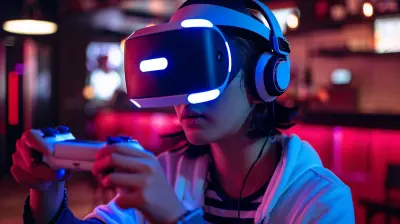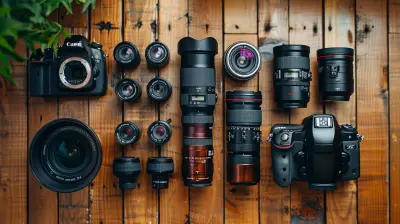How Wearable Health Devices Are Redefining Fitness Tracking
3 September 2025
Have you ever felt like your fitness tracker knows you better than your gym buddy does? It buzzes when you sit too long, cheers when you hit your step goal, and even scolds you when your heart rate spikes during your Netflix binge. Welcome to the age where wearable health devices aren't just tracking your jog—they're transforming how we understand and approach health.
Let’s dive deep into this fascinating world where tech meets biology, and discover how these tiny devices strapped to your wrist (or wrapped around your finger) are quietly reshaping the future of fitness.![]()
The Quiet Revolution on Your Wrist
Remember the basic pedometers we used to clip onto our waistband? Yeah, those were the Stone Age. Today’s wearables are sleek, intelligent, and loaded with sensors that make them feel more like tiny doctors than fitness accessories.From Apple Watches and Fitbits to Oura Rings and even smart shoes—wearables are less about counting steps and more about decoding your body’s secrets. They monitor heart rate variability, oxygen saturation, sleep cycles, stress levels, and even blood glucose (in some cutting-edge models). Sounds futuristic, right? But it’s happening now.
And the kicker? These little gadgets are doing more than just collecting data—they’re using artificial intelligence to interpret it, predict patterns, and give you personalized health insights.![]()
From Passive Tracking to Active Coaching
Gone are the days when wearables just counted your steps and clapped when you hit 10,000. Now they’re more like virtual health coaches.These devices analyze your movement, heart rate, and even your stress patterns to not only track what you do but guide you to do better. Some can detect if you’re overtraining or at risk of injury. Others nudge you to get up and move if you’ve been stagnant for too long. No guilt-tripping here, just helpful reminders… well, maybe a little guilt-tripping.
And it’s not just fitness. Some wearables can flag signs of illness days before symptoms appear. Imagine your smartwatch whispering, “Hey, your heart rate’s off and your sleep has tanked. Maybe go easy today?” That’s next-level care.![]()
Real-Time Biofeedback — The Game Changer
Let’s talk biofeedback. It’s this magical real-time loop between your body and your wearable. Feeling stressed? Your device knows. It might vibrate subtly, suggesting you take five and breathe.That’s not sci-fi—that’s biofeedback in action.
Wearables are like emotional support companions now. They recognize patterns in your vitals and behavior, then offer prompts—breathe, walk, chill out, hydrate.
This isn’t reactive health, it’s proactive. You’re catching problems before they snowball. That’s a monumental shift from the old-school model where you’d only react after something went wrong.
Think of it as having a mini health guru who never sleeps and always has your back (or wrist).![]()
The Rise of Personalized Fitness Plans
Here’s where things get spooky-smart—in a good way.Modern wearables don’t just spit out raw data. They learn from you. Using AI and machine learning, they tailor advice based on your habits, progress, and even your goals.
Trying to lose weight? Your wearable tracks your calories burned, your macros, your heart rate zones, and your sleep efficiency—then recommends tweaks. Training for a marathon? It’ll analyze your gait, recovery time, and even suggest rest days.
It’s like having a personal trainer, nutritionist, and sleep therapist rolled into one, minus the hefty fees.
And because it’s based on your unique input, it's not just personalized—it’s hyper-personalized.
The Sleep Connection You Didn't Know You Needed
Let’s be honest—most of us are terrible at sleeping. We doom-scroll into the night, then wonder why we feel like zombies in the morning.Enter wearable sleep tracking.
These gadgets go full detective mode while you snooze—monitoring your REM cycles, light and deep sleep, even your breathing. They show you how well (or poorly) you’re actually resting.
The insights can be eye-opening. You might discover you’re tossing and turning more after late-night snacks or sleeping like a baby after a walk. Many devices now offer sleep scores and tips to improve your recovery.
And since rest is just as critical as reps when it comes to fitness, this is a piece of the puzzle we can’t afford to ignore.
Stress Management: The Unsung Hero
We all know stress is a silent killer. But what if your wearable could catch spikes in stress before you even realize you're under pressure?Many modern fitness trackers come equipped with stress sensors—using heart rate variability and skin conductivity to detect stress levels. Some even offer guided breathing exercises and meditation prompts right on the device.
Think of it as a mindfulness coach who taps you on the wrist before you go full meltdown mode.
By logging and managing stress, wearables are helping people avoid burnout, improve mental clarity, and even reduce physical symptoms like high blood pressure or insomnia.
How It’s Reshaping Medical Monitoring
Now here’s where it gets seriously powerful—wearables are stepping into the medical world.Devices like the Apple Watch can detect irregular heart rhythms and notify users of potential atrial fibrillation. Chronic conditions like diabetes and hypertension are being tracked more effectively with connected health wearables.
Some devices can even send key metrics directly to your healthcare provider, allowing for early intervention. Imagine skipping the emergency room because your wearable flagged something days earlier. We’re talking about potentially life-saving tech here.
This is no longer about counting steps—it’s about extending lifespans.
Challenges To Be Aware Of
Alright, let's not pretend everything's perfect. Wearables have their flaws, too.Accuracy can be hit or miss depending on the brand and sensor quality. Privacy is a growing concern—after all, you're handing over a treasure trove of health data. Who owns it? How is it stored? These are important questions.
Also, information overload is real. When your watch is constantly buzzing with data, you might feel more anxious than empowered.
The key? Use wearables as a tool—not a dictator. Listen to the insights, but don’t let the device run your life.
The Future—Even More Intimate
So, what’s next?Think about smart clothes that monitor muscle fatigue, or contact lenses that track glucose levels. Heck, we’re already seeing earwear that maps brain waves.
And let’s not forget about the fusion of wearables with augmented reality and the metaverse. Pretty soon, your digital twin might be working out beside you, giving real-time feedback in VR. Wild, huh?
As wearable tech becomes more accurate, more intimate, and more intelligent, the line between technology and biology might blur completely.
One day, your wearable won’t just track your health—it might help optimize your genes. Sounds like science fiction? Give it five years.
Final Thoughts: Are You Wearing Your Health Yet?
In this new era, fitness isn’t about brute force or sweating buckets—it's about understanding your body on a whole new level.Wearable health devices have taken the guesswork out of our fitness journeys. They're like having a window into your own biology—keeping you informed, motivated, and, most importantly, aware.
So, the real question is: if your health is your most valuable asset, why wouldn’t you be tracking it?
Your next step might not be a sprint—it could be a quick glance at your wrist.
Welcome to the future of fitness.
all images in this post were generated using AI tools
Category:
Technology InnovationAuthor:

Marcus Gray
Discussion
rate this article
1 comments
Maddox Anderson
Exciting advancements! Wearable tech truly empowers us to take control of our health journey.
September 16, 2025 at 4:37 AM

Marcus Gray
Thank you! It's inspiring to see how wearable tech is enhancing our health and fitness experiences.


